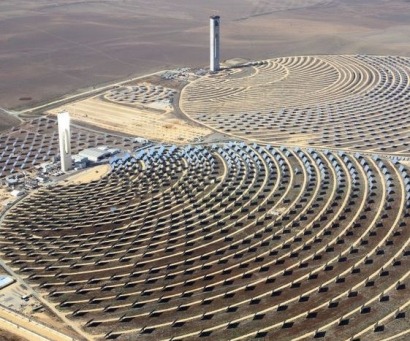
Revenues increased by 15 percent up to €3,402 million. Earnings before interest, tax, depreciation and amortization grew by 34 percent to reach €531 million, representing a margin of 15.6 percent, compared to 13.4 percent in the same period of 2012; while net income stood at €67 million, a decrease of 11 percent compared the same period of last year.
During the first six months of 2013, Abengoa generated €161 million of cash from its operating activities; while it closed the first half with total cash and cash equivalents of €3,222 million and a net corporate debt of €2,446 million, which represent a corporate net leverage ratio of 3.2x, versus 3.7x as of December 2012.
Revenues reported for the industrial production segment - which just includes the bioenergy business - increased by 8 percent up to €984 million. EBITDA also increased up to €41 million, compared to €5 million in the first six months of 2012, an increase of 681 percent.
The better results in the first half of 2013 were mainly due to the higher ethanol sales prices in Europe and the United States and the higher cane crushed capacity in Brazil along with a significant increase of the crush spread in Europe and the United States.
The company said its geographic diversification continues to be one of the key factors behind its growth and strategy. A total 30 percent of its revenues during the report period came from the US, while 27 percent came from Latin America, 18 percent from Spain, 12 percent from the rest of Europe and 13 percent from Asia and Africa.
“Once again, we have been able to deliver another strong quarter, maintaining our double-digit top line and operating growth while increasing our visibility for the remainder of 2013 and 2014," said Manuel Sánchez Ortega, CEO of Abengoa. "Our E&C business is facing an excellent momentum in the market, thanks to our diversification, with new significant contract awards taking backlog to above €7.1 billion.
"And what is most important, the vast majority of these new awards will require no equity contribution from Abengoa, thus helping us to achieve our reduced CAPEX targets from 2014 on," Ortega continued. "I am also satisfied to say that we are seeing improved market conditions in Biofuels, and that the electric sector reform announced by the Spanish government in July will finally remove the uncertainty we’ve suffered for almost two years.”
Corporate transactions
During the second quarter of 2013, Abengoa successfully closed the sale of 100 percent of its subsidiary, Befesa, to funds advised by Triton, following the approval by competition authorities.
After customary net debt adjustments, total equity consideration to Abengoa amounted to €620 million. This transaction was another successful step in Abengoa’s strategy to focus on its core activities, which include the engineering, development and operation of solar-thermal plants, water desalination plants, transmission lines and biofuels production plants. Additionally, during the second quarter of 2013, Abengoa closed the sale of Bargoa to Corning Incorporated, one of the company’s Brazilian subsidiaries that manufactures telecommunications components.
Results by segment
Revenues in the Engineering and Construction (E&C) segment, including the result from technology activities, increased by 17 percent to €2,182 million. EBITDA increased by 24 percent to €350 million, which represents a margin of 16.0 percent. The E&C division continued building momentum this quarter, with new order bookings driving the total backlog to €7,133 million as of June 30, 2013, an increase of 14 percent from the previous quarter. Finally, the E&C pipeline of identified commercial opportunities is approximately €110 billion, providing great visibility into the future.
Revenues in the concession-type infrastructures area, which primarily comprises electricity generation and transmission, increased by 31 percent up to €236 million during the first half of 2013; with an EBITDA of €140 million, which represents a margin of 59.3 percent.
The increased business activity was mainly driven by the start of several concessions (Qingdao desalination plant in China, the Manaus transmission line in Brazil and the cogeneration plant for Pemex in Mexico) which offset a weaker year-over-year performance in solar as a result of the Spanish government’s successive reforms of the electricity sector at the beginning of 2013 and the highly unfavorable weather conditions during the quarter.
For additional information:

